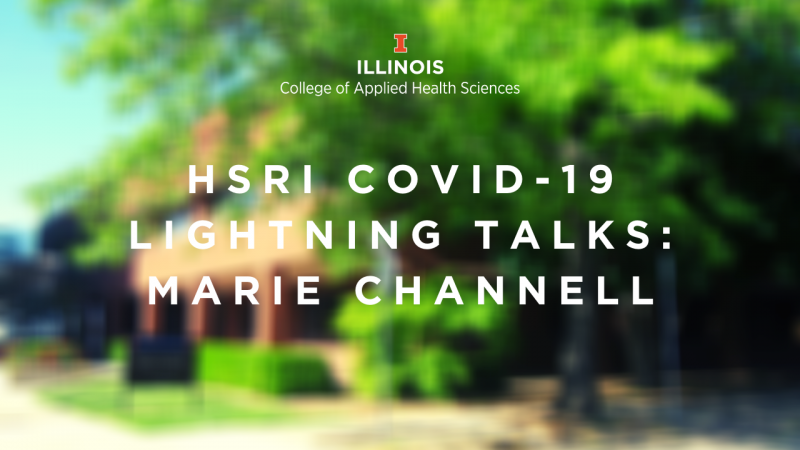
HSRI Lightning Talks—Marie Moore Channell
Marie Moore Channell, assistant professor in the Department of Speech and Hearing Science in the College of Applied Health Sciences at the University of Illinois, recently took part in the HSRI Lightning Talks for COVID-19, hosted by Paulanne Jushkevich, Associate Vice Chancellor for Advancement, Health Sciences & Research Initiatives.
PAULANNE JUSHKEVICH: It's 1 o'clock Central time. And I'm welcoming you to the HSRI Lightning Talks specifically about COVID-19. Because we all just can't hear enough of COVID-19, can we? My name is Paulanne Jushkevich. I'm the Associate Vice Chancellor for Advancement for Health Sciences and Research Initiative, which is where the HSRI comes from. I'm going to go ahead and introduce our very first speaker.
MARIE CHANNELL: --video camera, as you can see. I'm just going to share a slide while I'm talking. I want to thank you for making time for this today. We've already heard about many ways the current pandemic is challenging us and pushing us to rethink our daily practices. And this topic is no different. As many of you probably experienced or observed firsthand, there are many challenges that families with children at home are facing while schools and daycare centers are closed.
Parents and grandparents have become full-time teachers and sitters on top of their work and other family demands. They're also figuring out how to talk to children about difficult topics concerning the pandemic itself. And as we move toward more reopening and finding our new normal, this conversation with our children will shift toward what to expect and how to safely go out in public.
Most of my work is focused on helping children with developmental disabilities such as Down syndrome and autism. And some of the strategies that we use often with these children who need more guidance about how to interact in social settings could also be applied more broadly to all children during this time.
For example, one common strategy we use is social stories, which are pictures or cartoons that break down the steps of a social situation like how to order food at a restaurant. Social stories can be applied to the current pandemic for things like explaining what to do when we go outside, why we wear masks, how to physically distance ourselves, and the importance of hygiene and so on. How to live through a pandemic is new for all children. And social stories can be simple yet powerful tools for helping our children visualize the steps and have a sense that they know what to expect.
They also open the conversation for dialogue about how and why, which are important for building children's abstract thinking and their language skills. Families can make their own social stories. If you're interested in seeing some examples, there are a lot available on the internet. You can just Google COVID-19 social stories. Also, if you're on Facebook, you can look at our Department of Speech and Hearing Sciences page to see other things that we're doing that would be applicable to all children such as online storytime. And then finally, I wanted to point out that for children with speech and language disorders who typically receive therapy in the schools to support their communication skills and academics, their lives have been even more disrupted.
But with this challenge, I think comes an opportunity. So our department's audiology and speech language pathology clinic has transformed the services that it provides into telepractice so our clinicians can connect with and provide therapy to children with speech and language delays from a distance.
For example, they can use video chat to guide children to practice their communication skills. With modern technology, you can actually do quite a bit of activities and games in real time that promote skill development. And it also builds children's skills in their natural environments outside of the clinic, which can be very beneficial. It's also more flexible because it can happen anywhere almost anytime. So through telepractice, we're able to reach families who may not have been able to come to the clinic for traditional in-person services. In fact. Our clinic will be providing telepractice to families across the state at no charge over the summer while children are out of school and unable to connect with their school-based therapists.
And then for those families who may need these services beyond the summer, we'll be able to offer the option to continue receiving services through telepractice even once we resume face-to-face therapy. So this is also a way we're able to reach families that we would not have previously when we were only offering face-to-face services. And then in addition to community outreach, telepractice provides our graduate student clinicians with a unique educational opportunity to build a new skillset that they'll be able to take with them into their careers as speech language pathologists. I certainly don't want to minimize the challenges we're facing right now.
But I do always try to find a way to see the positive side in difficult situations. And I think that telepractice is a great example of how through this challenging time, we're being pushed to develop innovative practices that can have a positive long-term impact. Thank you again for your time. I've provided my personal contact information here and information about our clinic in case you have any questions. Thank you.
PAULANNE JUSHKEVICH: Thank you so much, Marie. That's great.
